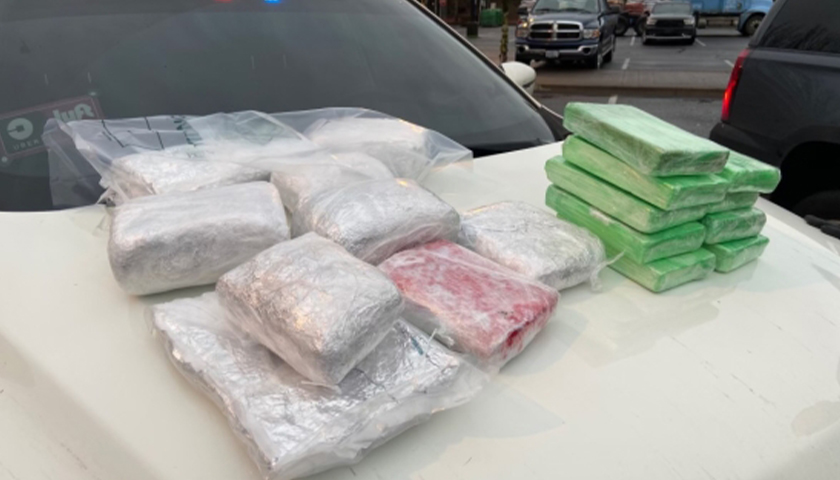by Bethany Blankley
Florida Attorney General Ashley Moody and Connecticut Attorney General William Tong are leading a multistate, bipartisan effort urging President Joe Biden to classify illicit fentanyl as a weapon of mass destruction (WMD).
“I first called for President Biden to take swift action in July and call fentanyl what it is – a weapon of mass destruction,” Moody said. “Now, I am leading a bipartisan coalition of 18 attorneys general demanding the president take action now, declare fentanyl a WMD and join us in our fight to prevent the death and destruction caused by this highly-lethal substance from getting even worse.”
In July, Moody called on the president to designate fentanyl as a WMD but she hasn’t heard back. Now 17 attorneys general, both Republicans and Democrats, are joining her.
“Treating this solely as a narcotics control problem has failed to curb the proliferation of increasing quantities of chemicals that can cause a mass casualty event. Your own DEA Administrator has called fentanyl ‘the deadliest threat [the DEA] ha[s] ever seen.’ We should treat it as such – thus bold action must be taken,” the AGs wrote.
“We must not sit idly by until a terrorist chooses to inflict harm using this substance on a large group of Americans – our countrymen are already dying from this poison. We cannot wait for tragedy to strike when proactive steps can be taken now to preserve American lives. We urge you, take immediate and decisive action and declare fentanyl a weapon of mass destruction.”
Due to the low cost of producing fentanyl and its inherent lethality and vast availability, they argue it would be “an ideal choice for bad actors to use as a chemical weapon.”
“We are aware of scenarios that different federal and state agencies have considered utilizing and causing mass casualty events,” they write. “Just two milligrams of fentanyl is needed to kill an adult, and it can easily be placed in other substances. … In addition to different government agencies looking at fentanyl related scenarios, fentanyl has already been used as a weapon – the Russian army used it to end a hostage crisis two decades ago, killing more than 120 hostages in the process.”
According to the Department of Homeland Security, a WMD “is a nuclear, radiological, chemical, biological or other device that is intended to harm a large number of people.”
According to a February 2019 memo written by DHS Assistant Secretary for Countering Weapons of Mass Destruction James McDonnell, fentanyl’s “high toxicity and increasing availability are attractive to threat actors seeking non conventional materials for a chemical weapons attack,” Task & Purpose first reported.
The illicit drug is pouring through the southern border at an alarming rate and in alarming amounts, the AGs argue.
In July alone, U.S. Customs and Border Protection seized 2,100 pounds of illicit fentanyl. In fiscal 2021, CBP agents seized 11,200 pounds of fentanyl. So far in fiscal 2022, they’ve seized 10,600 pounds.
Two milligrams, the weight of a mosquito, is lethal. A teaspoon holds about 5,000 milligrams, enough to kill 2,500 people. One pound of fentanyl, or 453,592 milligrams, could kill 226,796 people.
In both fiscal years so far, CBP agents have confiscated enough fentanyl to kill nearly 5 billion people.
The world’s population is currently 7.9 billion people, according to Worldometer.
Texas DPS also has seized more than 340.5 million lethal doses, enough to kill the entire population of the United States.
At a multi-law enforcement security briefing held in Tallahassee on Wednesday, Moody met with former federal drug officials, Families Against Fentanyl and law enforcement leaders to discuss the growing threat of fentanyl facing the U.S.
Fentanyl is the leading cause of death of adults in the U.S. between the ages of 18 and 45. In 2020, 77% of all teen overdose deaths involved fentanyl, according to a study published by JAMA.
Attorneys General from Arkansas, Guam, Indiana, Kansas, Kentucky, Montana, Nebraska, Nevada, New Hampshire, New Mexico, Oklahoma, South Carolina, Tennessee, Texas, Virginia and West Virginia signed the letter.
– – –
Bethany Blankley is a contributor to The Center Square.
Photo “Fentanyl Pills” by The United States Attorney’s Office District of Oregon.





